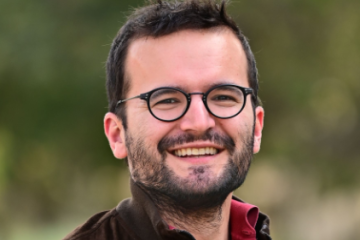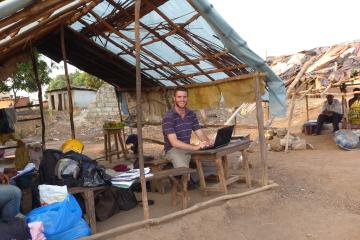
Postdoc Spotlight: Justine Knebelmann, J-PAL '24, on her research journey at J-PAL Africa

In our new postdoc alumni spotlight series, we spoke with Justine Knebelmann, J-PAL '24, about her experience as a postdoctoral researcher at J-PAL Africa.
What drew you to the field of development, and in particular experiments with governments and digitalization? What questions have motivated your research?
I started being interested in development in my early years of university, and used that time to carry out internships in Sub-Saharan Africa. I spent six months in Tanzania, at a time when the natural gas industry was growing rapidly, raising hopes for a better future. This led me to read about what is called the ‘resource curse,’ particularly, how revenues from natural resources are generally found to be less transformative for socio-economic outcomes than revenues raised by governments through taxation. My internship was with an aid agency and I was exposed to a lot of foreign and non-governmental actors, while at the same time becoming more and more interested in the role of governments themselves in shaping development outcomes. A few years later I was lucky to find a research assistant position in Uganda which allowed me to push these interests further, and I spent an incredibly enriching year sitting at the Uganda Revenue Authority. I started seeing first hand the untapped potential of improved data management and digitization, and this made me enthusiastic about pursuing a PhD in this direction!
What was your motivation for doing a PhD and what attracted you to do a postdoc at J-PAL?
Immediately after my Master's, I wasn't sure about the decision to do a PhD. However, through different internship experiences I realized that I would enjoy having the time and leeway to dig deep into a topic I liked and gain solid quantitative skills. I also found that the field of development economics provides a balance that perfectly meets my aspirations, between academic-oriented activities—such as designing a research experiment, relating it to the literature, presenting in research seminars, empirical and conceptual analysis, writing up papers—and project-oriented activities—such as working with government partners, producing policy advice, raising funds, working in teams, and seeing real-world impacts of your work.
Towards the end of my PhD, my coauthors and I were lucky to receive funding from J-PAL’s DigiFi Initiative for our project on the digitization of property taxation in Senegal. When I learned that the initiative was hiring a new postdoc, it seemed like a perfect fit with my research interests. I was especially enthusiastic about connecting and learning from senior academics thinking about similar issues and also working with government partners.
You were a postdoc with the Digital Identification and Finance Initiative (DigiFI) through J-PAL Africa, though you spent most of your time at MIT. What excited you most about working with DigiFI and what are some things you learned from that experience?
I had started working on digitization for one of my PhD projects, but the postdoc was an exciting opportunity to broaden my horizon on the topic. It was very interesting to learn about the partnerships that the DigiFI team was setting up with different government actors throughout Africa, and share practices on bringing them on board for research collaborations. I also loved taking part in J-PAL Africa's efforts to broaden its reach among African scholars, such as the summer school in Abidjan in 2022. J-PAL is also an amazing platform to enlarge one's network and meet researchers with the same interests. Spending the postdoc at MIT was invaluable as it allowed me to be part of the development group in the economics department, while at the same time getting feedback on my research regularly from other groups (public finance, organizational economics). I also strongly benefitted from the supervision of Tavneet Suri, who was extremely generous with her time and comments throughout the postdoc.
What resources and networks were available to you while at J-PAL and how did you use them?
As a J-PAL postdoc, one can apply for funding from the corresponding initiatives. This helped me directly: I and a group of co-authors obtained seed funding for a new project in the Gambia around local taxation and waste management, and we have now launched the actual RCT building on this first phase. With another team of co-authors, we obtained seed funding for a new project on social protection in Senegal, which has allowed us to carry out preparatory work with the government. While still competitive, the access to funding opportunities is very precious for researchers in their early career stage. The J-PAL network also led me to meet new researchers, some with whom I started collaborating, and others with whom I hope to do so one day.
You’ve since taken your talents to Sciences Po, France as an Assistant Professor. Could you tell us about your new role? How did your time at J-PAL help prepare you for it?
The Postdoc helped me prepare for the "job market" which refers to the centralized international application process for Assistant Professor positions in economics departments. Indeed, I was able to take the time to strengthen my job market paper, get valuable feedback from my supervisor, and present it in front of various audiences. The postdoc also helped me develop my research pipeline, which is something departments look for when hiring new Assistant Professors. In my new role, I will continue working on my research agenda around state capacity. I will also teach in an International Development Masters, as well as a Policy Evaluation class, both of which align very well with my interests and what I was able to nurture at J-PAL!
What advice would you give PhD students who might be interested in pursuing a postdoc at J-PAL and/or a career in line with yours?
The J-PAL postdoc is a great pathway to strengthen your research portfolio and network before moving on to a more senior position. It's important to highlight that it prepares one well, both for academic positions and non-academic jobs, so it can also be a good time to decide what one prefers for those who might be hesitating. J-PAL is a rich and diverse network and being part of it will most likely open new doors. The job ads for postdoc positions are not centralized in one given place, and the exact modalities may vary by region or initiative, so it's important to stay tuned via J-PAL's newsletters and websites such as JOE, EJM.
Can you share a fun or memorable anecdote from your postdoc experience that made your time as a J-PAL postdoc special?
I loved participating in J-PAL Africa's team retreat in 2021 in South Africa. There are no J-PAL offices in the countries where my projects are based, so it was exciting to realize how many people are part of J-PAL Africa overall. We were warmly welcomed and discovered a lot, although the trip was sadly cut short by the emergence of Omicron during the Covid-19 pandemic, and we had to hop on the last operating flights!... In a less epic format, I was lucky to participate in the celebrations of J-PAL's 20th anniversary, both in Paris and in Boston, two days that were both fun and inspiring.



